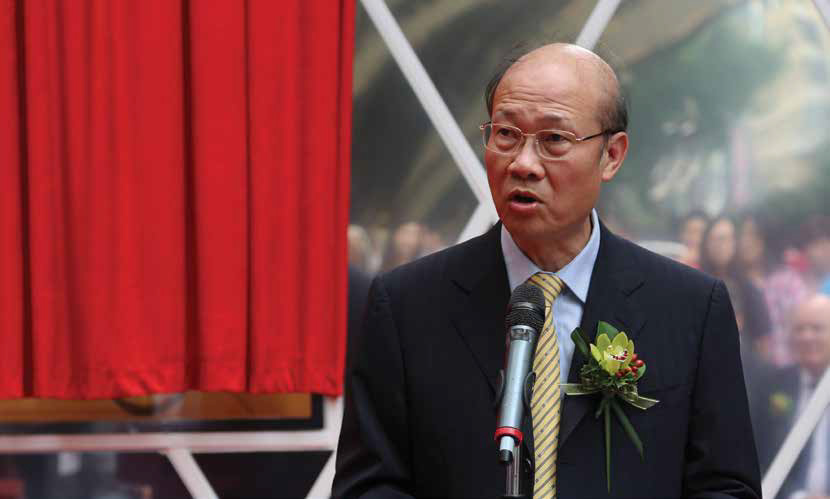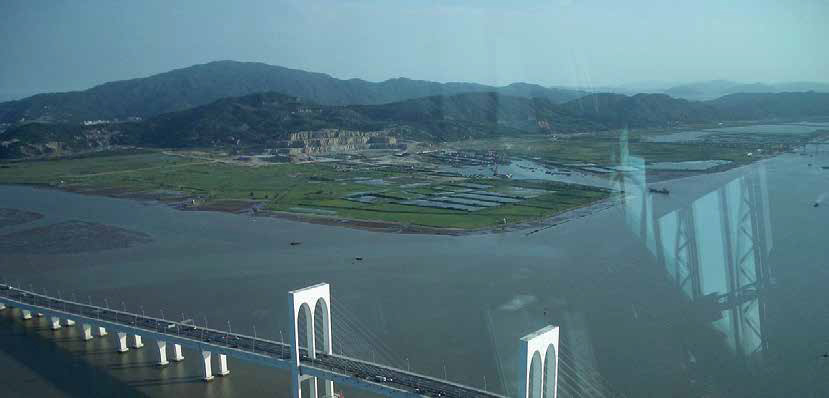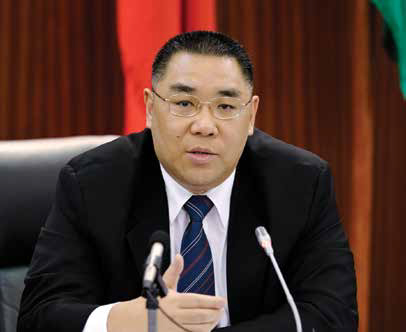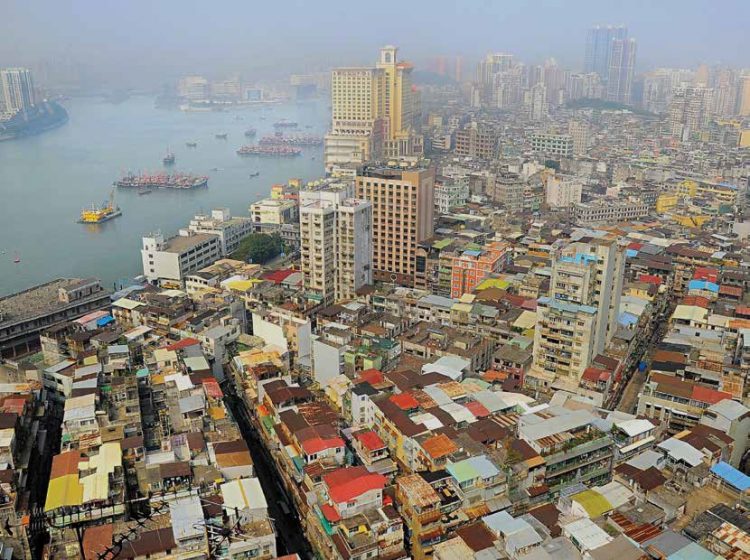The Macau government is eyeing a number of measures to help ease the city’s sky-high property prices and strained transport infrastructure. Though the details are still unclear, they will likely pass part of the burden to casino operators
When Macau Chief Executive Fernando Chui Sai On declared in August that the city’s casino operators should provide housing and transportation for their migrant workers, the operators were taken by surprise.
“It is the first time I heard about this,” commented Ambrose So, chief executive of SJM Holdings. “And we’ll continue to negotiate with the government to see what the exact policy is.”
Mr Chui’s announcement was made as part of his policy platform ahead of his unopposed election to a second term by a 400-member pro-Beijing election committee. The policy is regarded as a means to alleviate pressure on Macau’s housing and transport infrastructure in the face of mounting dissatisfaction among residents, who feel surging numbers of tourists and imported workers have made home prices unaffordable and the city’s roads overly congested.
In the run-up to the election, Mr Chui admitted his second—and constitutionally final—five-year term would likely be fraught with “many problems and challenges, particularly in light of increasing demands from Macau residents who feel squeezed out by the influx of tourists and migrant workers”. The pressure will mount further with six new megaresorts scheduled to open in Cotai starting next year.
Meanwhile, Beijing wants the Macau government to step up. Last month, President Xi Jinping met with Mr Chui and congratulated him on winning a second term, but noted, “The internal and external environment of Macau has witnessed great changes and that will require better work from the new administration.”

‘ALL SIDES NOW’
As of July, the number of imported workers in Macau stood at 158,234, more than double the 74,900 in December 2009 when Mr Chui began his first term. The government predicts the territory’s employed population will expand by 20,000 annually over the next few years. Imported labor accounted for 40.9% of the total employed population of 387,000 in July, compared with only 24% of the 312,000 workers in December 2009. “That could rise to nearly 190,000 by 2016, or 170,000 based on the government’s forecast, bringing the ratio of migrant to local workers to 1:1,” says Joey Lao Chi Ngai, president of the Association of Macau Economic Sciences.
“We believe the ability of the city to take in more foreign labor would come with consideration on housing, transportation and any ancillary facilities and support required for a larger population. It could also bring inflationary pressure,” says gaming analyst Phoebe Tse of investment bank Barclays, who also predicted in a recent research report that the territory would require 35,000 additional migrant workers in the 2015-17 period.
“The importation of workers, in one way, has facilitated economic development, but it also has direct impact on the living standards of residents,” says Andy Loi Man Keong, head of the Collective Wisdom Policy Center, a think tank of the General Union of Neighborhood Associations of Macau, one of the city’s largest pro-Beijing grass-roots associations. He points out, for example, that “They [the migrant workers] have to travel between Macau and Cotai every day and the residents have to wait for longer to get onto crowded buses during peak hours.”
Demand from foreigners has also driven property prices beyond the reach of many residents, Mr Loi adds. Home prices have more than quadrupled from MOP25,631 (US$3,203.9) a square meter in the fourth quarter of 2009 to MOP111,542 in Q2 2014, whereas the median monthly salary of residents only increased about 50% to MOP15,000 over the same period. Rental prices for mid-range homes were up 12.3% year on year in the first half of this year, after increasing 20.6% and 30.3%, respectively, in 2013 and 2012, according to property agent Jones Lang LaSalle Macau. “With the new gaming facilities coming online in Cotai from next year, we expect to see a more active residential market,” says Jeff Wong, head of residential properties at the firm. “According to our in-house statistics, on average, there will be about 2,700 new units completed each year from 2014 to 2016. It is believed that the new supply is inadequate to meet the strong leasing demand from expatriate workers.”
Residents have become increasingly vocal in airing their dissatisfaction about the downsides of Macau’s economic development. In May, the city saw its largest street demonstrations since its return to Chinese sovereignty in 1999, with protestors decrying a lavish perks bill for senior officials.
“With more and more demands from the community, the new administration cannot continue simply prioritizing commercial interests. It has to balance the interests of all sides now,” says Eilo Yu, associate professor for public affairs at the University of Macau.
SHARING THE LOAD
It appears the government is now intent on making the city’s casino operators bear some of the burden in striking that balance. In a bid to make Macau “a livable city,” Mr Chui has vowed to place the onus on arranging accommodation and transportation for migrant workers on casino operators and large companies.

“How [the casino operators] do it is flexible. The principle is to let the gaming operators take up some of the responsibility and alleviate the capacity [of the city],” said Mr Chui, suggesting that possible options include operators directly providing housing or providing financial support to workers. His office declined Inside Asian Gaming’s request for an interview to elaborate further.
“At present we have already offered housing allowances to our non-resident employees,” SJM’s Mr So told the media after Mr Chui announced his election manifesto in August, referring to a Macau law that all local companies have to provide their migrant workers either housing or a monthly housing allowance of no less than MOP500 (US$62.6). He added: “We cannot build [the houses] in the air so where does the land come from?”
MGM China Holdings is also waiting for discussions with the government on this “quite complex topic,” as CEO Grant Bowie puts it.
“The issue still stands as Macau struggles with land, and we also need to collaborate in understanding where we should be building these types of facilities, if that’s the expectation on how we should be collaborating,” Mr Bowie stated during a recent media event.
Galaxy Entertainment Group Vice Chairman Francis Lui also stressed during his company’s latest earnings call that his company always offers either housing or allowances to its imported workers.
Furthermore, all six casino operators provide free shuttle bus services to their employees.
Legislator Ella Lei of the Macau Federation of Trade Unions points out that unless the casino operators build new housing, they will continue exerting pressure on the local housing market. “If, instead, the companies only offer financial allowances to their non-resident workers, it will still drive up rental prices,” she says, while calling on the government to “strictly review” the foreign labor quotas offered to the casinos.
Though Mr Chui has not outlined clearly what he wants, he is probably also looking for answers across the border. “This can be solved through regional cooperation [with Guangdong province],” acknowledges Davis Fong, director of the Institute for the Study of Commercial Gaming at the University of Macau. “As there is
limited land in Macau … the gaming operators can cooperate with the Guangdong government via the coordination of the [Macau] administration to have accommodations on places like Hengqin [a Chinese island located adjacent to Macau] for their migrant workers. Complemented by appropriate traffic arrangements, this can reduce the competition for public spaces between Macau residents and migrant workers.”
Mr Fong, a member of the committee that re-elected Mr Chui, adds: “And this will not have much significant impact on the operating costs of the operators.”
Mounting labor tensions at Macau’s casinos, which have already witnessed eight public protests this year, are already having an impact on profit margins, with operators having to offer improved salaries and benefits to retain staff in an environment where the citywide unemployment rate of 1.7% is one of the lowest in the world. Analyst Karen Tang of Deustche Bank forecast in an August research note that the casinos’ labor costs in 2014-17 will grow 10-15% annually, up from her previous forecast of 5-8%, potentially dampening margins by 0.5-0.7%.
THE HENGQIN OPTION
Jack Chang, vice president of the Macau Association of Economic Sciences, says now is a good time for operators to acquire land across the border to build accommodation for their staff, given the recent softness in the mainland Chinese property sector.
Mr Chui announced in May that the Macau government had asked Beijing for permission to use an additional 10 square kilometers of land on Hengqin to build accommodations for migrant workers. Already, five square kilometers have been zoned on the island for development by Macau enterprises. Guangdong Gov. Zhu Xiaodan responded a month later that Hengqin must first undergo land reclamation before Macau is awarded any additional space on the island, adding that any further talks on the issue would have to wait until the completion of the reclamation.
Mr Chang suggests the government could consider, in the meantime, “allowing casinos to build temporary accommodations on some idle land plots in Macau as a short-term measure”.
The border between Macau and mainland China is currently open between 7 a.m. and midnight. “If the border can open around the clock, migrant workers can opt to live on the mainland side, which would reduce pressure on the local property market,” says Tommy Lau, a government-appointed legislator and president of the Macau Association of Building Contractors and Developers. Barclays analyst Phoebe Tse shares that view, stating a 24-hour border crossing “could potentially allow many lower-paid workers to live in Zhuhai and Hengqin and commute to work through these borders”.

Mr Chui has said since 2011 that it is his intention to push for borders that are open around the clock, but signs of progress have only emerged recently. Chinese customs officials announced in August, shortly before the chief executive election, that the border terminal at the Macau-Zhuhai Cross Border Industrial Zone would be allowed to operate 24 hours a day, paving the way for mainland workers—the largest segment of the local migrant labor force, accounting for nearly two-thirds of the total—to travel between Macau and accommodations on the mainland around the clock, though the officials stopped short of revealing when the new provisions would come into effect.
As part of his policy manifesto, Mr Chui reiterated that casino dealer jobs would be off-limits to non-locals for as long as he is in office. He also called on casino operators to promote locals within their ranks and “give priority in purchasing products designed and purchased in Macau”. These issues, as well as the possible imposition of other social responsibilities on casino operators, are likely to come up during the review of the Macau government’s gaming policies and the renewals of the gaming concessions expected to begin next year or 2016. Mr Chui has so far refused to offer more details apart from saying the review process will be transparent and the public actively consulted.
Joey Lao of the Association of Macau Economic Sciences, another member of the chief executive election committee, says Mr Chui has made himself very clear on one point: “The economy has advanced so much in the past several years, triggering several deep-rooted issues such as the housing problems. … Mr Chui’s political manifesto clearly states there will be reins put on Macau’s biggest industry—the gaming industry—and the budget surpluses accumulated over the past decade should be invested in improving residents’ livelihoods.”
“I think the chief executive has raised important issues, and we need to sit down with the government and work through the issues,” MGM China’s Grant Bowie said, “and one of those things is understanding exactly what the expectations are [and] working collaboratively together.”

































